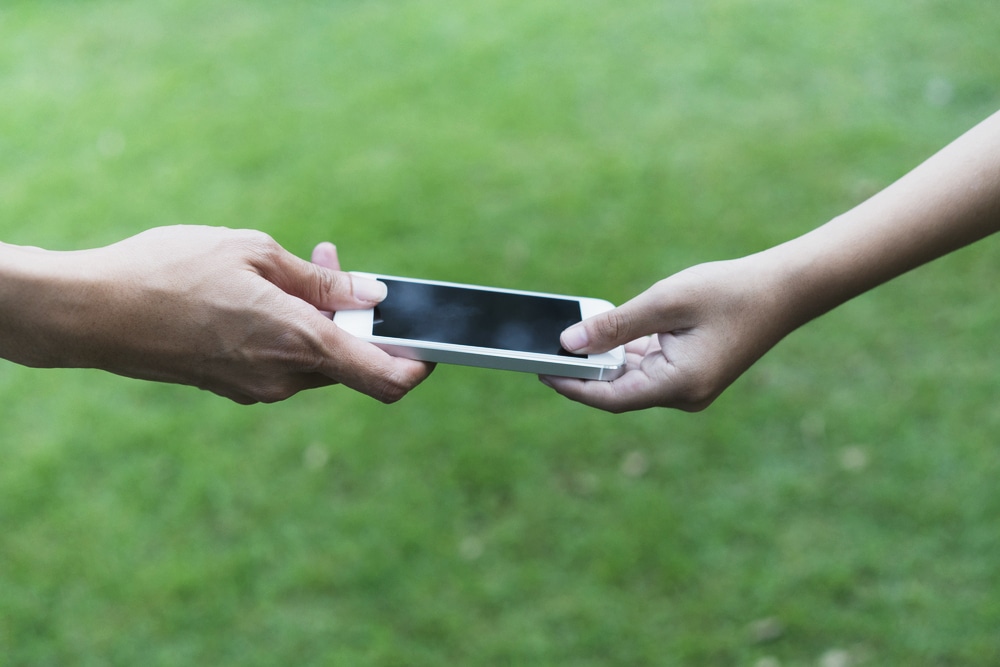Handing a phone for the first time to your child is as almost as important as baby’s first steps. It is actually a big event in fostering since the device usage affects literally all aspects of the child’s life. It takes time, affects sight and brain activity, and hereafter the school performance.
Before giving the device, parents should do their own homework and find out what their kids are going to face when using the device. The information allows deciding whether it is reasonable to postpone it until the kid grows older. Or vice versa, if it is the right time for getting acquainted with the tech world.
IMAGE: SHUTTERSTOCK
The survey, sponsored by Common Sense Media, found that teens spend about nine hours a day on screens and gadgets, this, of course, includes surfing the Internet. This nearly doubles the stats from 2014, according to the Cox 2014 Internet Safety Survey.
The phone itself does not represent any interest if not connected to the Internet and does not have apps. Kids did and will play games. Parents should realize that this is time-consuming and most kids do it at school and after it at the expense of sleep and homework. Later we will talk about how to prevent it. However, this is the common practice among children. Therefore, apps might be a huge distraction machine if not controlled.
Installed apps lead to the web. The device’s connection to the Internet is a large aspect to worry about because this is where the pitfalls hide. So if your kid is connected to the Internet via their device, they might encounter:
- Inappropriate content show-ups
- Ads
- Calls to action which invite to different sites you might not approve
- Cyberbullying
- Online abusers
- Invitations to secret death groups (yep, they exist)
- Invitation to sexting
- Contacts with hidden online predators
Let us overview each of them. Inappropriate show-ups, random ads, calls to action mean the device is not filtered by the phone and commercial sites. Promoting their services have literally a free access to your kid. At this point, you have to decide whether you’re ok that any kind of information will nurture your kid’s brain.
[pullquote]Cyberbullying is a big problem children face on the Internet. It is evolving, modifying and meantime affecting kids’ mental health and even life because it deals with inferior complexes.[/pullquote] There were death precedents. Parents did not know children suffered from being bullied online.
There are 750 000 registered child predators only in the USA. They are used to hiding under teenage profiles and strive to meet in person. You cannot guarantee that an abuser will not befriend your child on Facebook.
Secret death groups flooded social media. The most popular is the Blue Whale Game’s group, which took lives of 130 children. They recruit kids via social media and almost always stay unnoticed till a kid commits a suicide as a final game’s task. The experience has shown that parents have no clue about their kid’s participation in such games.
Sexting is not writing SMS hinting on sex. Now sexting online means sharing sexually explicit material. Children involved in sexting might be considered as online abusers. This can ruin their reputation for many years.
If you still want to hand a phone to your kid, and I am sure you do, do it wisely. Set rules and apply control. First, you need to discuss what is allowable to your kid. You need to agree on how much time and when your kid can spend on the device. Also, make sure they are not going to go online or play games at school or while doing home assignments. Discuss what apps and sites they would like to visit and why. Try to anticipate the situation when an inappropriate content shows up. Explain to your kid that they should close it because it damages their brain.
How to apply control over the device and the Internet usage? As it was previously stated, the device usage is about using apps and going online. Obviously, to monitor and manage it, parents should use the full-featured parental control app. Why full-featured? The parental control app should provide parents with the opportunity to access social media, messengers, sites children turn to nowadays. So is the Kidgy parental control app.
The software allows monitoring your kid’s online activity as well as offline life. This sounds helpful if your kid met somebody online and then wants to meet in person. This is what actually happens according to the Pew Research Center.
Kidgy makes visible chatting, sites your child visited, the browsing history. In other words, it allows you to see what your kid is doing online and prevent the dangers. Besides viewing, you can block sites as well as the apps installed on your kid’s device. The software is free of charge unless you want to upgrade to use extra features.
Every single big event requires the preparation. The knowledge and practice are key factors for making the-phone-handing-for-the-first-time process successful for parents and kids.
For more smartphone-related stories and information from us here at Bit Rebels, click here.


COMMENTS